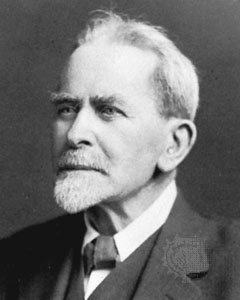History of anthropology
History of Anthropology refers to the study of humanity from its beginnings millions of years ago to the present day. The field of anthropology is divided into various sub-disciplines including cultural anthropology, physical anthropology, archaeology, and linguistic anthropology. The history of anthropology is a rich tapestry that weaves together the efforts of countless individuals to understand the vast complexity of human cultures, societies, and biological evolution.
Origins of Anthropology[edit | edit source]
The origins of anthropology lie in the Renaissance and Enlightenment periods in Europe, where scholars began to systematically think about the diversity of human cultures and the possibilities of human existence. Early anthropological thought was influenced by the encounters of Europeans with diverse peoples during the age of exploration. Notable figures such as Marco Polo and Christopher Columbus brought back accounts of other ways of life, sparking curiosity and debate among European scholars.
19th Century: The Foundation[edit | edit source]
The 19th century is often considered the formal beginning of anthropology as a distinct field of study. During this period, scholars attempted to categorize and understand the diversity of human cultures and the evolutionary history of humans. Two important figures of this era are Lewis Henry Morgan and Edward Burnett Tylor, who are often credited with laying the foundational concepts of cultural evolution and the comparative method in anthropology. This period also saw the emergence of physical anthropology, with scientists like Charles Darwin influencing the field with his theory of evolution.
20th Century: Theoretical Diversification[edit | edit source]
The 20th century witnessed a significant diversification of anthropological theory. Early in the century, Franz Boas emerged as a prominent figure, advocating for the importance of fieldwork and cultural relativism, which became foundational principles in cultural anthropology. His students, including Margaret Mead and Ruth Benedict, further developed these ideas and applied them in their research. The mid-20th century saw the rise of structuralism, led by Claude Lévi-Strauss, who introduced a new way of analyzing cultures through the underlying structures of human thought.
In the latter half of the century, anthropology became increasingly self-critical, leading to the development of postmodern and interpretive anthropologies. Scholars like Clifford Geertz emphasized the importance of understanding cultures through their symbols and meanings, while others critiqued the discipline's colonial roots and called for more reflexive and ethical research practices.
Contemporary Anthropology[edit | edit source]
Today, anthropology is a global discipline that encompasses a wide range of perspectives and practices. Anthropologists work in a variety of settings, from academic institutions to applied fields in development, health, and policy. The discipline continues to evolve, incorporating new methodologies like digital ethnography and addressing contemporary issues such as globalization, climate change, and human rights.
Sub-disciplines of Anthropology[edit | edit source]
Anthropology is divided into several sub-disciplines, each focusing on different aspects of human life:
- Cultural Anthropology: Studies cultural beliefs, practices, and expressions.
- Physical Anthropology: Focuses on the biological aspects of humans, including evolution and physical diversity.
- Archaeology: Investigates past human societies through material remains.
- Linguistic Anthropology: Examines the role of language in social life.
- Applied Anthropology: Uses anthropological knowledge to solve contemporary problems.
Conclusion[edit | edit source]
The history of anthropology is a testament to humanity's enduring fascination with itself. From its early beginnings to its current form, anthropology has sought to understand the vast diversity of human experience and the common threads that bind humanity together. As the world becomes increasingly interconnected, the insights provided by anthropology will be crucial in navigating the complexities of global society.
Search WikiMD
Ad.Tired of being Overweight? Try W8MD's physician weight loss program.
Semaglutide (Ozempic / Wegovy and Tirzepatide (Mounjaro / Zepbound) available.
Advertise on WikiMD
|
WikiMD's Wellness Encyclopedia |
| Let Food Be Thy Medicine Medicine Thy Food - Hippocrates |
Translate this page: - East Asian
中文,
日本,
한국어,
South Asian
हिन्दी,
தமிழ்,
తెలుగు,
Urdu,
ಕನ್ನಡ,
Southeast Asian
Indonesian,
Vietnamese,
Thai,
မြန်မာဘာသာ,
বাংলা
European
español,
Deutsch,
français,
Greek,
português do Brasil,
polski,
română,
русский,
Nederlands,
norsk,
svenska,
suomi,
Italian
Middle Eastern & African
عربى,
Turkish,
Persian,
Hebrew,
Afrikaans,
isiZulu,
Kiswahili,
Other
Bulgarian,
Hungarian,
Czech,
Swedish,
മലയാളം,
मराठी,
ਪੰਜਾਬੀ,
ગુજરાતી,
Portuguese,
Ukrainian
Medical Disclaimer: WikiMD is not a substitute for professional medical advice. The information on WikiMD is provided as an information resource only, may be incorrect, outdated or misleading, and is not to be used or relied on for any diagnostic or treatment purposes. Please consult your health care provider before making any healthcare decisions or for guidance about a specific medical condition. WikiMD expressly disclaims responsibility, and shall have no liability, for any damages, loss, injury, or liability whatsoever suffered as a result of your reliance on the information contained in this site. By visiting this site you agree to the foregoing terms and conditions, which may from time to time be changed or supplemented by WikiMD. If you do not agree to the foregoing terms and conditions, you should not enter or use this site. See full disclaimer.
Credits:Most images are courtesy of Wikimedia commons, and templates, categories Wikipedia, licensed under CC BY SA or similar.
Contributors: Prab R. Tumpati, MD





